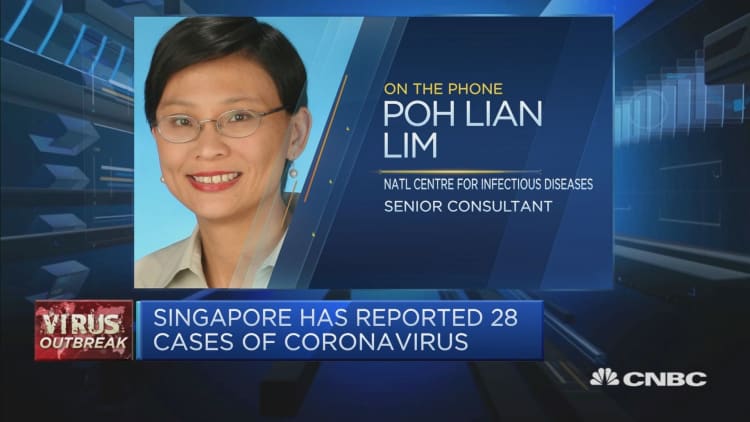
Singapore raised its risk assessment to the second highest level of alert on Friday as the number of coronavirus cases linked to China rose to 33.
The Southeast Asian nation — which has one of the most confirmed cases of the mysterious new virus — raised the Disease Outbreak Response System Condition (DORSCON) to orange. That means the disease can be easily transmitted and is severe, but contained.
The system is color-coded, starting from green at the lowest level, followed by yellow, orange and red — the highest risk level. During the SARS outbreak 17 years ago, which killed 33 people in Singapore and infected 238, the status was orange.
On Friday, three new cases were announced, which took Singapore's total confirmed cases to 33, according to the health ministry. The youngest patient so far is a six-month-old baby.
Tourism impact
The impact on the tourism sector will be "significant" as tourists from mainland China accounted for 20% of Singapore's total international visitors last year, Keith Tan, chief executive of the Singapore Tourism Board, told CNBC on Thursday, one day before the alert was raised.
"The Chinese economy is a lot more significant now than it was 17 years ago during SARS. And ... in 2003, for tourism, China accounted for just 9% of our international visitor arrivals," he told CNBC Thursday. "Now it's about 20%. So the direct impact, everyday this lasts, will be more significant than SARS."
The latest coronavirus outbreak, thought to have originated from a seafood market in the Chinese city of Wuhan, has brought back memories of SARS.
During the SARS epidemic in 2002 and 2003, regional economies including Singapore were sent into a tailspin. Singapore was among the worst-hit countries in Asia during SARS.
Singapore bars travelers from China
As the current outbreak worsened, China in January ordered travel agencies to stop organizing tours to other countries.
Last week, Singapore began barring those arriving from mainland China, if they had been there in the past 14 days, from entry or transit. Authorities also stopped issuing visas to those with a Chinese passport.
Singapore will now focus on reaching out to other markets in attracting a "good share of non-China markets," Tan said.
He pointed out that Singapore already has a good mix of visitors from other regions — with around 30% from other parts of Southeast Asia and another one-third from the rest of the world. Northeast Asia, which includes China, also makes up about a third of the total number of visitors.
'Doubling down' on hygiene efforts
Tan said the government is now rallying on efforts to protect visitors by ramping up its hygiene standards.
"We have to shore up defenses," he said, adding that the government is "doubling down" on a clean-up at hotels and attractions.

"In many ways we are in a better place with this outbreak 17 years on," said Lim Poh Lian of Singapore's National Centre for Infectious Diseases.
"Many of the public health measures that we have taken have controlled outbreaks in the past, even outbreaks for which we had no effective anti-virals or vaccines," she told CNBC on Thursday.
She said the country had two to three weeks of advance warning before the first cases were detected, adding that was "helpful" for preparation.



